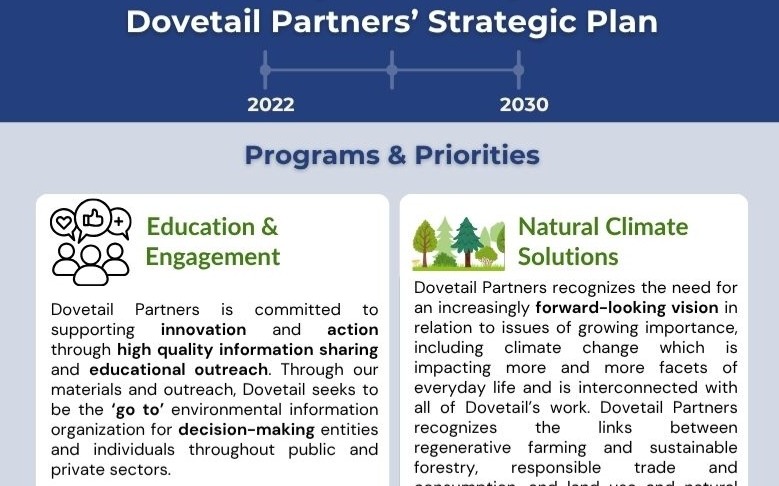A Consumer-Focused Initiative
This month, Dovetail Partners begins a series of reports on responsible consumption. The series builds upon earlier industry-oriented efforts related to what we termed; responsible materials.[1]
The objective of this new consumer-focused series is to provide information that:
-stimulates thinking about evaluation of consumption choices,
-provides a rationale for limiting adverse environmental and social impacts of consumption, and
-offers ideas on how to satisfy needs while consuming less.
Given the number of choices we are faced with as shoppers each day, it isn’t possible or practical to research each of them. It is, however, possible for each of us to employ a set of simple guidelines as we go about our daily lives that can lead to better decisions.
A decade ago, the Oregon State University Extension Service developed what they dubbed The Unshopping Card. It was a wallet-sized card that began with the question “Do I really need this?” the most important question in addressing responsible consumption. Then, assuming that the answer to the first question was “Yes” the would-be consumer was led through a series of additional questions:
-Do I Really Need This?(the most important question)
-Could I borrow, rent, or buy it used?
-Is there a smaller model that might work just as well?
-Is it made of renewable or recycled materials?
-Is it recyclable or biodegradable?
-Is it energy efficient?
-Is it water efficient?
-Is it worth the time I worked to pay for it?
-Is it over-packaged?
-How long will it last?
-If it breaks, can it be fixed?
-How will I dispose of it?
-What is its environmental and social cost?
The last question in this list is often the most difficult to find answers to, and this question is the focus of the new Dovetail series.
Reports in the series will be based on information gathered from a variety of sources. Verified life cycle information will be utilized to the extent possible in reporting environmental performance of various products. Information from sources recognized for integrity in product testing and reporting will also be heavily used. In those instances where information must be taken from other sources, care will be exercised to ensure accuracy as much as possible. And, as in all Dovetail reports, sources of information will be transparently identified, with links provided for those who wish to investigate further.
Responsible Consumption – It Can Make a Difference
We – all of us – consume stuff. And production of stuff requires raw materials, whether from new sources, or materials captured via recycling. Some form of manufacturing and distribution is also involved. What happens in the process of producing and delivering products to shelves and showrooms is important, as the stuff we consume invariably impacts the environment, as well as the social fabric of communities closest to where raw material extraction and production takes place. Consequently, every choice we make as consumers has consequences beyond those to our wallets and whatever satisfaction we might gain from our purchases. Making an effort to understand those consequences, and to act upon that understanding to minimize negative impacts, is what responsible consumption is all about.
Aside from the quantity of goods consumed (a major determinant of impact), how society consumes also has a significant effect on the environmental and social impacts of that consumption. Increasingly, information is available to manufacturers, distributors, and consumers about impacts linked to the materials and products available for purchase. Such information, on which Dovetail’s reporting will be based, allows moving beyond using instincts and best guesses of consumption impacts to being able to make well-informed consumption decisions.
Becoming an Informed Consumer
Life Cycle Assessment
Life cycle assessment (LCA) provides the most reliable way to determine environmental impacts of a product or production process. LCA-based information yields data about a wide range of environmental impact measures for products or product components that can’t be obtained any other way. LCA measures key impacts such as total energy required in producing a product (referred to as embodied energy), fossil fuel consumption, total resource use, water use, global warming potential, ozone depletion potential, emissions, and more. The assessment encompasses product production, use, and disposal.
The data collected in an LCA are measurable (not subjective) and gathered and analyzed following a set of internationally recognized rules.Thereby, the resulting analyses can be reproduced and verified. Scientific findings are applied in determining the environmental significance of resource flows and emissions. The measurable, reproducible aspects of life cycle assessment are key to its usefulness in environmental reporting, as it ensures that assessment is systematic and scientifically-based. This approach reduces or eliminates the pitfalls of being reliant on intuition, bias and unsubstantiated claims.
At the present time LCA is widely used in the industrial and business sectors. Manufacturers utilize the power of LCA to identify specific aspects of raw materials procurement, production and distribution systems that result in the greatest environmental impacts. The information is essential to reliably redesigning products or production processes to achieve lower impact. LCA is used as well by purchasing departments of wholesalers and retailers in selecting lower impact, lower resource consuming products, and by architects and engineers in the process of designing structures and specifying building materials for the purpose of optimizing environmental performance.
Life-cycle-based information can also be used to compare various products for specific applications. A growing number of published studies of product comparisons are available to consumers; however, at this point there is no one repository where these studies can be easily found.[2] The value of an information hub, in addition to making information easier to find, is that studies can be reviewed before posting for consumer use. Oversight of LCA is important since product manufacturers occasionally issue or finance misleading reports. At some point in the future, verified life cycle assessment-based information in the form of product labels for a wide range of products will help to inform purchasing decisions of individual consumers.
Other Information Sources
Many sources of information can be used to help guide purchase decisions. In addition to LCA, there are a number of certification programs such as the UL Label and the Good Housekeeping Seal of Approval. The number of such programs increased dramatically beginning in the early 1990s. Today, scores of certification programs cover a wide variety of products and product attributes and each can be researched through online and publically available sources of information. Not everything offered to the public is accurate or truthful, so it is important to consider the source when seeking information.;
Summary
A new consumer-oriented series of Dovetail reports Consuming Responsibly kicks off this month (September 2018). The reports will be based on peer-reviewed science as well as information from sources which have a reputation for integrity in product testing and reporting. It is our goal to stimulate thinking about how to evaluate consumption choices, provide a basis for limiting adverse environmental and social impacts of consumption, and offer ideas as to how to satisfy needs while using less.
[1]Bowyer, J., Howe, J. and Fernholz, K. 2006. What is a Responsible Material Anyway? Dovetail Partners, Inc., Oct. 25. (http://www.dovetailinc.org/reports/What%20is%20a%20%22Responsible%20Material%22%20Anyway_n441?prefix=%2Freports)
[2]An initiative to create such an information hub for information related to building construction, interior furnishings, and maintenance was mounted in 2010 by the National Institute for Science and Technology in the form of the BEES (Building for Environmental and Economic Sustainability) program. The website is currently under redevelopment and mostly unavailable to the public, but should become available in the near future. (National Institute for Science and Technology. 2010. Building for Environmental and Economic Sustainability (BEES). (https://www.nist.gov/services-resources/software/bees)
- Lead AuthorBowyer
- DateSeptember 2018
- CategoryEnvironmental, Waste
- Project FileDownload

.png)
.png)
.png)

.png)
.png)